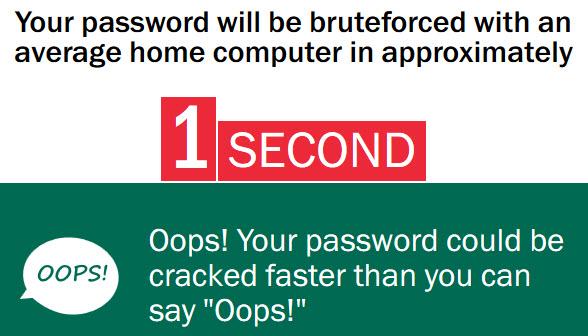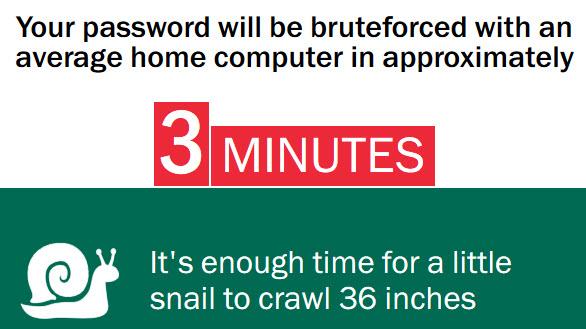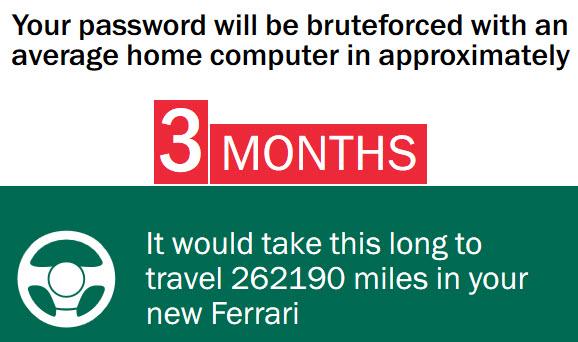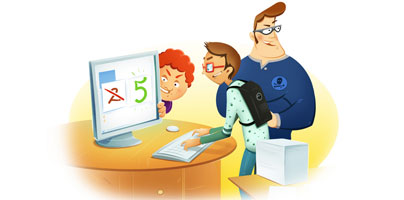Secure Password Check, a reliable password checking website created by Kaspersky Lab, will put your password’s strength to the test and tell you how long it would take the bad guys to break it – not with some over-the-top scheme, but with a brute force attack performed on an average home computer.
The best thing about the website is that it links your password’s strength with a funny message.
If you have a weak password that can be easily bruteforced, you’ll see a message like this one.

Or this one.

And if you have a strong password that’s hard to break, you’ll see a message like this one.

Or this one.

Picking a strong password isn’t that hard
Here are my top tips:
Turn quotes or sayings into strong-passwords
AVAST suggests using pop culture references to create strong passwords. You could take a memorable quote from a movie or some lyrics from your favorite song, and use them to create a password.
Remember the diner scene from Pulp Fiction? Take the first letters from “Everybody be cool, this is a robbery!” and use them to come up with this password: Ebc,ti@r! According to Kaspersky Lab’s Secure Password Check, it would take 42 years to break this password.
If you want something that’s even harder to break, take Grandmaster Flash‘s 1982 song The Message and use the lyrics “Don’t push me ‘cuz I’m close to the edge” to create this password: 82DpmcIctte. Secure Password Check says it would take 10000+ centuries to break it.

This reminds about a video British security company Sophos posted on YouTube way back in 2009. In the video, security blogger Graham Cluley presents a similar means of creating strong passwords.
Make your life easier by using a password manager
Worried that you won’t be able to create a strong password, that you won’t be able to follow any of the tips presented above, and that is giving you a headache? Forget everything I told you above and relax.
You don’t have to know anything about security to create strong passwords. There are specialized software applications out there that can generate secure passwords for you. They’re called passwords managers. They can generate strong passwords, they can safely store all your passwords, they can automatically enter passwords into the required forms, and they can even sync your passwords across all your devices.
Here are 10 great passwords managers that won’t cost you a thing. They're free!
Don’t share your passwords with ANYONE
You’re in a relationship, a committed relationship, and you share everything with your significant other. As a sign of trust, you also share your passwords. Don’t kid yourself! If the relationship goes sour, and chances are that it will, this could come back to bite you in the ass. This infographic from Intel Security says you should think twice before sharing private data because 1 in 10 people have been threatened by their ex following a breakup.
Password sharing isn't limited to relationships. According to a recent survey by Kaspersky Lab, nearly half of internet users shared their passwords with somebody or left them visible for people to see.
“Consumers need to be more cyber-savvy about passwords. Once shared, it is very difficult to know exactly where your password will end up. Our research shows that there is a real disconnect between the understanding of why we need strong passwords and the action people take to keep them safe. No one would expect a friend or family member to knowingly divulge a password, but by sharing passwords, consumers are increasing the risk of them falling into the wrong hands. This could give cybercriminals easy access to personal and financial information and hacked accounts can be used to distribute malicious links and files, harming others. At worst, entire identities could be put at risk. Even the most complex password is weak if it’s visible to others, so keep it to yourself,” said David Emm, Principal Security Researcher at Kaspersky Lab.
Enable two-step authentication (if available)
You should enable two-step or two-factor authentication, even if you picked a strong password, even if your password is protected by a password manager. Two-step verification is a godsend. It works like this:
Two-step authentication is available for Facebook, Google, and more.
In related news…
Alongside multiple paid products, Kaspersky Lab has several free security solutions to offer. These 5 will help you protect your Windows PC.
Macs need protection too. The new Kaspersky Virus Scanner for Mac can find and remove the latest malware threats.
The best thing about the website is that it links your password’s strength with a funny message.
If you have a weak password that can be easily bruteforced, you’ll see a message like this one.

Or this one.

And if you have a strong password that’s hard to break, you’ll see a message like this one.

Or this one.

Picking a strong password isn’t that hard
Here are my top tips:
- Don’t pick something guessable – stay away from easily guessable things like your birthday or your child’s name.
- Don’t use words – if you’re going to pick a word as your password, you’re making life easier for the bad guys. Throw in some numbers and special characters or symbols. A strong password should be more than 8 characters long and it should include uppercase and lowercase letters, numbers, as well as special characters.
- Do not recycle passwords – don’t use the same password for all your online accounts. Recycling is a good idea if you care about the environment, not if you care about keeping your data safe.
- Regularly change your passwords – I know it’s a pain and a nuisance, but you should regularly change your passwords.
Turn quotes or sayings into strong-passwords
AVAST suggests using pop culture references to create strong passwords. You could take a memorable quote from a movie or some lyrics from your favorite song, and use them to create a password.
Remember the diner scene from Pulp Fiction? Take the first letters from “Everybody be cool, this is a robbery!” and use them to come up with this password: Ebc,ti@r! According to Kaspersky Lab’s Secure Password Check, it would take 42 years to break this password.
If you want something that’s even harder to break, take Grandmaster Flash‘s 1982 song The Message and use the lyrics “Don’t push me ‘cuz I’m close to the edge” to create this password: 82DpmcIctte. Secure Password Check says it would take 10000+ centuries to break it.

This reminds about a video British security company Sophos posted on YouTube way back in 2009. In the video, security blogger Graham Cluley presents a similar means of creating strong passwords.
Make your life easier by using a password manager
Worried that you won’t be able to create a strong password, that you won’t be able to follow any of the tips presented above, and that is giving you a headache? Forget everything I told you above and relax.
You don’t have to know anything about security to create strong passwords. There are specialized software applications out there that can generate secure passwords for you. They’re called passwords managers. They can generate strong passwords, they can safely store all your passwords, they can automatically enter passwords into the required forms, and they can even sync your passwords across all your devices.
Here are 10 great passwords managers that won’t cost you a thing. They're free!
Don’t share your passwords with ANYONE
You’re in a relationship, a committed relationship, and you share everything with your significant other. As a sign of trust, you also share your passwords. Don’t kid yourself! If the relationship goes sour, and chances are that it will, this could come back to bite you in the ass. This infographic from Intel Security says you should think twice before sharing private data because 1 in 10 people have been threatened by their ex following a breakup.
Password sharing isn't limited to relationships. According to a recent survey by Kaspersky Lab, nearly half of internet users shared their passwords with somebody or left them visible for people to see.
“Consumers need to be more cyber-savvy about passwords. Once shared, it is very difficult to know exactly where your password will end up. Our research shows that there is a real disconnect between the understanding of why we need strong passwords and the action people take to keep them safe. No one would expect a friend or family member to knowingly divulge a password, but by sharing passwords, consumers are increasing the risk of them falling into the wrong hands. This could give cybercriminals easy access to personal and financial information and hacked accounts can be used to distribute malicious links and files, harming others. At worst, entire identities could be put at risk. Even the most complex password is weak if it’s visible to others, so keep it to yourself,” said David Emm, Principal Security Researcher at Kaspersky Lab.
Enable two-step authentication (if available)
You should enable two-step or two-factor authentication, even if you picked a strong password, even if your password is protected by a password manager. Two-step verification is a godsend. It works like this:
- Enter your username and password to log into your account.
- A code will be sent to you; enter this code to confirm that you’re the one trying to access your account and thus complete the login procedure.
Two-step authentication is available for Facebook, Google, and more.
In related news…
Alongside multiple paid products, Kaspersky Lab has several free security solutions to offer. These 5 will help you protect your Windows PC.
Macs need protection too. The new Kaspersky Virus Scanner for Mac can find and remove the latest malware threats.

























